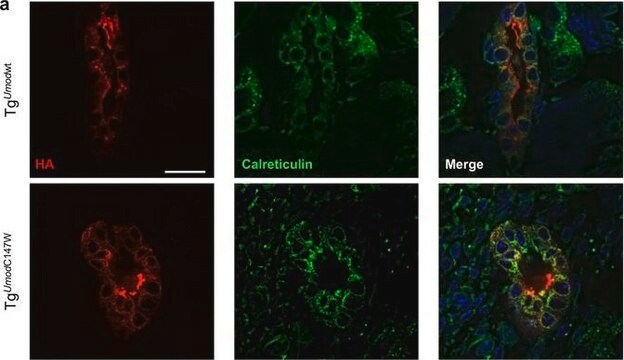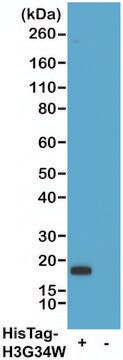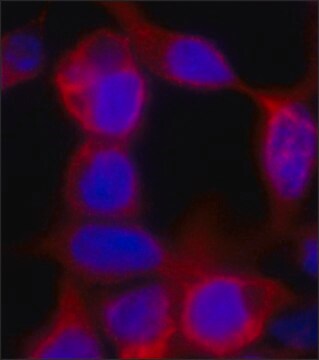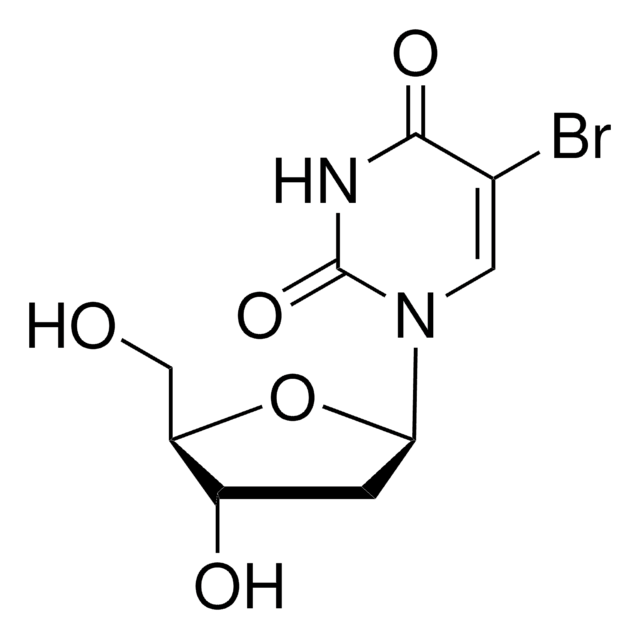05-949
Anti-Histidine Tagged Antibody, clone HIS.H8
clone HIS.H8, Upstate®, from mouse
Synonym(s):
HIS Tag Antibody
Sign Into View Organizational & Contract Pricing
All Photos(1)
About This Item
UNSPSC Code:
12352203
eCl@ss:
32160702
NACRES:
NA.43
Recommended Products
biological source
mouse
Quality Level
antibody form
purified antibody
clone
HIS.H8, monoclonal
species reactivity (predicted by homology)
all
manufacturer/tradename
Upstate®
technique(s)
immunocytochemistry: suitable
immunoprecipitation (IP): suitable
western blot: suitable
isotype
IgG2b
shipped in
dry ice
target post-translational modification
unmodified
General description
His-Tag is a series of at least 6 histidine residues used as a tag motif at the N- or C-terminus of recombinant proteins. The relatively small size of this tag vs. other commonly used tags such as GST (30 kDa) makes it less likely to interfere with target protein structure or function. Its small size also makes it more suitable for use under denaturing conditions. His tags are most often used for affinity purification and binding assays. His tags bind to nickel or cobalt ions with high affinity, and this interaction with metal ions is the basis of many his-tag based affinity media. The His Tag epitope is widely used to detect expression of recombinant proteins in bacterial, yeast, insect,and mammalian systems.
Specificity
Recognizes tag sequence HHHHHH on either the N- or C-terminus of any recombinant fusion protein; no other amino acids surrounding the 6x-His tag sequence are required for the recognition of the 6x-His tag.
Immunogen
6x His synthetic peptide.
Application
Immunocytochemistry:
2 μg/mL of a previous lot of antibody showed positive immunostaining for His tagged Akt1/PKBα in transfected HeLa cells.
Immunoprecipitation:
This antibody has been reported by an independent laboratory to immunoprecipitate His Tagged proteins.
2 μg/mL of a previous lot of antibody showed positive immunostaining for His tagged Akt1/PKBα in transfected HeLa cells.
Immunoprecipitation:
This antibody has been reported by an independent laboratory to immunoprecipitate His Tagged proteins.
Research Category
Epitope Tags & General Use
Epitope Tags & General Use
Research Sub Category
Epitope Tags
RNA Binding Protein (RBP)
Epitope Tags
RNA Binding Protein (RBP)
This Anti-Histidine Tagged Antibody, clone HIS.H8 is validated for use in IC, IP, WB for the detection of Histidine Tagged.
Quality
Routinely evaluated by western blot and immunocytochemistry on transfected HeLa cells.
Western Blot Analysis:
0.5-2 μg/mL of this lot detected His tagged Akt1/PKBα in RIPA lysates of transfected HeLa cells.
Western Blot Analysis:
0.5-2 μg/mL of this lot detected His tagged Akt1/PKBα in RIPA lysates of transfected HeLa cells.
Physical form
Format: Purified
Purified
Purified mouse monoclonal IgG2b in buffer containing PBS, pH 7.4 with 0.05% sodium azide.
Storage and Stability
Stable for 1 year at -20°C from date of receipt.
Handling Recommendations:
Upon first thaw, and prior to removing the cap, centrifuge the vial and gently mix the solution. Aliquot into microcentrifuge tubes and store at -20°C. Avoid repeated freeze/thaw cycles, which may damage IgG and affect product performance.
Handling Recommendations:
Upon first thaw, and prior to removing the cap, centrifuge the vial and gently mix the solution. Aliquot into microcentrifuge tubes and store at -20°C. Avoid repeated freeze/thaw cycles, which may damage IgG and affect product performance.
Analysis Note
Control
RIPA lysates of transfected HeLa cells.
RIPA lysates of transfected HeLa cells.
Other Notes
Concentration: Please refer to the Certificate of Analysis for the lot-specific concentration.
Legal Information
UPSTATE is a registered trademark of Merck KGaA, Darmstadt, Germany
Disclaimer
Unless otherwise stated in our catalog or other company documentation accompanying the product(s), our products are intended for research use only and are not to be used for any other purpose, which includes but is not limited to, unauthorized commercial uses, in vitro diagnostic uses, ex vivo or in vivo therapeutic uses or any type of consumption or application to humans or animals.
Storage Class
10 - Combustible liquids
wgk_germany
WGK 2
Certificates of Analysis (COA)
Search for Certificates of Analysis (COA) by entering the products Lot/Batch Number. Lot and Batch Numbers can be found on a product’s label following the words ‘Lot’ or ‘Batch’.
Already Own This Product?
Find documentation for the products that you have recently purchased in the Document Library.
Customers Also Viewed
Michael W Lawlor et al.
Human molecular genetics, 22(8), 1525-1538 (2013-01-12)
No effective treatment exists for patients with X-linked myotubular myopathy (XLMTM), a fatal congenital muscle disease caused by deficiency of the lipid phosphatase, myotubularin. The Mtm1δ4 and Mtm1 p.R69C mice model severely and moderately symptomatic XLMTM, respectively, due to differences
Directed evolution of anti-HER2 DARPins by SNAP display reveals stability/function trade-offs in the selection process.
Houlihan, G; Gatti-Lafranconi, P; Lowe, D; Hollfelder, F
Protein engineering, design & selection : PEDS null
Alexa Patoine et al.
PloS one, 12(9), e0184568-e0184568 (2017-09-08)
BRIL (bone-restricted IFITM-like), is a short transmembrane protein expressed almost exclusively in osteoblasts. Although much is known about its bone-restricted gene expression pattern and protein biochemical and topological features, little information is available for BRIL physiological function. Two autosomal dominant
Felizza F Gunderson et al.
Infection and immunity, 83(3), 1008-1018 (2014-12-31)
Legionella pneumophila, the primary agent of Legionnaires' disease, flourishes in both natural and man-made environments by growing in a wide variety of aquatic amoebae. Recently, we determined that the Cas2 protein of L. pneumophila promotes intracellular infection of Acanthamoeba castellanii
ATX1-generated H3K4me3 is required for efficient elongation of transcription, not initiation, at ATX1-regulated genes.
Ding, Y; Ndamukong, I; Xu, Z; Lapko, H; Fromm, M; Avramova, Z
PLoS Genetics null
Our team of scientists has experience in all areas of research including Life Science, Material Science, Chemical Synthesis, Chromatography, Analytical and many others.
Contact Technical Service











